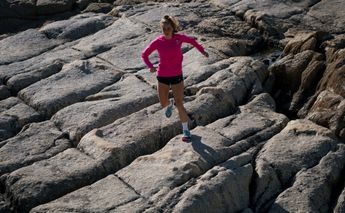Dr David de Klerk gives us some insight into a rather uncomfortable topic...
The morning was calm, the air was crisp with a salty smell from the ocean and the sun was showing off over the horizon. But I was crouching in a bush... Suffering from ‘the runs’ on my run. Or diarrhoea if you want me to name it...
Most runners have a story of how they stepped out the door, smile on their face, wind in their hair - the greatest time of day – only to have to shuffle off the trail or road into the nearest secluded location 15 minutes later to crouch down over the ground, all dignity lost, to evacuate their projecting stomach onto the ground. But why, you ask? Why did this happen.
I can still remember receiving my first lecture on diarrhoea in medical school. As soon as the slideshow’s title popped up onto the projector screen, the whole class (all 200 of us) giggled and nudged our friends in the ribs. After all, we’ve all had it at some point. So let’s not beat around the, uh, bush and address the elephant in the room.
Here are five important things to know about diarrhoea (and how it affects your running):
1. WHEN IN DOUBT, LET IT OUT
Diarrhoea is actually not a joke. In simple terms, it occurs when there is something in your bowels that your body does not want there. And this is my first piece of advice: LET your body get rid of it. As with a sneeze or a runny nose, your body is adept at expelling what it knows it should not accommodate... So let it do its thing. During the first hours/day of an episode of diarrhoea, don’t take anything to stop it. You’ll only end up prolonging the illness because you’re preventing you body from expelling it’s unwanted visitor.
2. REPLACING FLUIDS IS THE NAME OF THE GAME
The main cause of the sensation of fatigue associated with diarrhoea is water and electrolyte loss. Just as with sweating, diarrhoea is a major cause of fluid loss. This means that the main management of diarrhoea is to replace what you are losing. In medical practice, we work on 10 ml/kg of sugar/salt solution every time you pass a watery stool but this is quite a lot for an adult. A good goal to aim for is to drink 200 to 250 ml of sugar/salt solution every time you need to visit the loo. (See below for how to mix his at home.)
3. OVER THE COUNTER REMEDIES
Sugar/salt solution is easy enough to mix at home but there are also things you can buy at your local pharmacy without a prescription
Loperamide (Immodium) is an anti-diarrhoeal agent that essentially causes the bowel to relax. You can take two tablets straight away and then one every time you have an episode of diarrhoea thereafter. (Remember, try not to use immodium initially.)
Hyoscine butylbromide (Buscopan) is also a handy pill you can get over the counter. It works by arresting the painful contractions in the bowel you experience as stomach cramps and is the best analgesic (medication for pain) you can use for such discomfort. You can take 10 mg (usually 1 pill) every 8 hours.
You can also use paracetamol (Panado) for pain- 1 gram (2 tablets) every 6 hours. In combination with Buscopan, this will work nicely for pain. TAKE NOTE: Avoid all other forms of pain medications, especially non-steroidal anti-inflammatories (NSAIDs). This is pretty much everything other than Panado. The use of such drugs carries a risk of inducing kidney failure during exercise, especially when dehydrated.
4. WATCH YOUR DIET
If you find you are regularly experiencing diarrhoea on your runs, think of keeping a ‘Diarrhoea Diary’. Yes, the term may make you laugh but the result will make your stomach smile. Every time you have an episode of loose stools, make a note of what you ate before it happened. After awhile you might start to notice a trend: maybe dairy products don’t agree with you, perhaps your morning coffee is what’s setting you off or there might be even something you’re using on your run that is the culprit.
5. DIARRHOEA IS USUALLY VIRAL, NOT BACTERIAL
This means that antibiotics are not used to treat diarrhoea. In fact, many antibiotics induce a runny stomach as a side-effect. The one exception is what is termed ‘infective diarrhoea’. This occurs in both chronic diarrhoea (i.e. lasting more than 2 weeks) and dysentery (the presence of blood and/or mucous in your stool). If you have had diarrhoea constantly for more than 2 weeks or there is blood or a slimy substance in your stool, make an appointment to see a doctor.
Sugar/Salt Solution:
1 litre of clean water (if you’re unsure if the local tap water is okay to drink, boil it first then let it cool)
6 teaspoons of sugar
½ teaspoon of salt
Mix thoroughly and consume 200 ml for every loose stool you pass.
And that’s it! Work your way through the above tips and your stomach
will sit quietly while you put in the hard work. Happy running!



